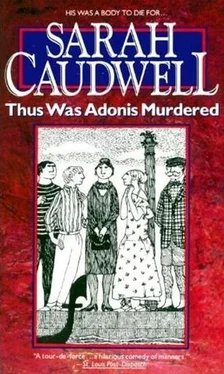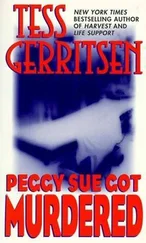“Well?” said Selena.
“One of the most celebrated makers of furniture in Venice in the seventeenth century was Andrea di Brustolon — Benjamin, you may remember, mentioned him the other evening. Julia, however, has probably never heard of him — she is not well up on the baroque and rococo periods.”
I cannot say that they yielded gracefully; but I eventually persuaded them that a mention by Eleanor of a “Brustolon armchair,” as an item in the Tiverton Collection which she would like to acquire, was more probable than any reference to some unknown larcenist; that the person against whom she had warned Kenneth in the earlier part of the conversation was almost certainly, in the light of what we had since learnt about him, the Major; and that what had to be kept under lock and key was not some mysterious object of value kept by Kenneth in his room, but the Collection itself, Eleanor having inadvertently disclosed to the Major Kenneth’s connection with it.
“But if Bruce doesn’t exist,” said Selena, “what’s Marylou doing in Venice?”
“That,” I answered, “I am expecting to learn very shortly. But nothing can happen before eleven o’clock. It’s now only just after half past ten — there’s plenty of time for someone to make some coffee.”
There was, while we drank our coffee, an absence of conversation rare in Lincoln’s Inn. My companions kept looking warily at the telephone, as if it might spontaneously deliver some Delphic utterance.
“Selena,” said Ragwort, at about quarter to the hour, “did you tell them downstairs that any calls for you should come through to this room?”
“Yes,” said Selena. “Of course.” And at ten to rang the Clerks’ Room to remind them.
We drank more coffee. The clocks within earshot of Lincoln’s Inn began to strike the hour.
“From your statement, Hilary,” said Ragwort, at five minutes past, “that nothing would happen before eleven, we have been assuming that something would happen after that time. You are now going, I suppose, to explain to us the fallacy in our reasoning.”
“My dear Ragwort, I would not dream of such heartless casuistry. Something will certainly happen — but how long after eleven, I cannot definitely say. Timothy may have difficulty getting in touch with us.”
At twenty past eleven the telephone emitted a buzz. Ragwort stretched out his hand towards the receiver.
The door, at the same moment, was thrown open with such intemperate violence as caused it to bang against the skirting-board and there irrupted into the room a young man of threatening aspect. I recognized, from seeing him at Heathrow, the belligerent thrust of the shoulders and the pugnacious jut of the wide jaw.
“Which of you,” asked our visitor, glaring furiously about him, “is Desmond Ragwort?” His accent was similar to Marylou’s, but his tone far less agreeable.
“I am,” answered Ragwort, without hesitation. He was, after all, among friends, and divided from the visitor by a substantial oak desk. “May I ask who you are and how I can assist you?”
The interruption had stayed his hand in its movement towards the telephone. Selena, sitting on the floor beside the kettle, contrived to amalgamate in a single movement of great rapidity the act of rising to her feet and that of crossing the room: most graceful and attractive if one had leisure to observe it. She lifted the receiver.
“My name,” said our visitor, “is Stanford Bredon and I want to know where my wife is. I want to know what the hell’s going on round here. I want to know—”
“Yes, Henry, of course I’m here,” said Selena. “Do please put Mr. Shepherd through as quickly as possible. No, Henry, I know you don’t know what it’s about. But I do, and it’s a matter of some urgency. Please, Henry.”
“I want to know,” continued Stanford, “why when I got home last night I found a note from my wife saying she’d had to go stay with her mother’s cousin Alice, because Alice was very sick. And when I called my wife’s mother in New York, because Alice is not on the telephone but I figured if something was wrong with her my wife’s mother would know about it—”
The resonance of his indignation prevented me, though I was now standing next to Selena and within twelve inches of the telephone, from hearing the other end of her conversation.
“She told me that her cousin Alice was right there with her in New York on a visit and had never felt better in her life.”
“Mr. Bredon,” said Ragwort, “the good health of your wife’s relative is a matter for rejoicing rather than condolence. If, however, it displeases you, you should surely address your complaint to her doctor, rather than myself.”
“Hilary,” said Selena, “there seems to be some difficulty with the police. Timothy says he must talk to you.” She handed me the receiver, relieving my frustration at being unable to hear what Timothy was saying — only partially, however, for Timothy also seemed to be speaking against a background of considerable noise, including, in particular, a baritone voice, which I took to be that of the Vice-Quaestor, complaining indignantly about the English.
“For heaven’s sake, Hilary,” said Timothy, “will you please explain to me what to tell the Vice-Quaestor?”
“Timothy,” I said, “what exactly has happened?”
“The English,” said the background baritone. “Always the English, always they make trouble. We are quiet, peaceful people in Venice, we do not have crimes, we do not have scandals. And then the English come—”
Stanford was now leaning across Ragwort’s desk, disposed, it seemed, if he could reach him, to throttle Ragwort with his bare hands.
“Ah,” said Selena, in her most placatory manner, “you must be Marylou’s husband. We’ve heard so much about you.”
“My dear Hilary,” said Timothy, “what has happened is that on your instructions I have diverted half the police force of Venice from its proper dudes—”
“We have no murders,” continued the baritone, “and then the English come here and murder each other—”
“And why,” said Stanford, “when I look in our address book, which is a joint address book, because Marylou and I believe that marriage is a relationship of absolute trust—”
“And that the Vice-Quaestor,” continued Timothy, “has noticed an alarming rise in the number of violent deaths within his jurisdiction—”
“And corrupt the morals of our young,” said the baritone.
“I find in that address book,” said Stanford, “a name and address which were not there before, of a person whom I do not know—”
“And the Vice-Quaestor,” said Timothy, “would, quite naturally, like to know how I knew what was going to happen. And since, as I have explained to the Vice-Quaestor, I have been acting entirely on your instructions, Hilary, and have no idea—”
“And eat sandwiches,” said the baritone, in tragic crescendo, “in the Piazza San Marco.”
“And that name,” said Stanford, “is Desmond Ragwort and his address is 62 New Square.”
“I say,” said Cantrip, “if you don’t take your hands off my learned friend Mr. Ragwort—”
“And the Vice-Quaestor is not prepared to let any of us leave Venice—”
“And I am not leaving this room—”
“Until he has a complete explanation.”
“Until I have a full explanation.”
“Hoocha!” cried Cantrip — poor boy, he had been longing for days for an opportunity to demonstrate his karate.
Palazzo Artemisio.
Friday afternoon.
Dear Hilary,
Since my telephone call this morning was made in rather difficult conditions and apparently coincided with the outbreak in Chambers of some sort of riot, I was unable to give you as full an account of the morning’s events as you would no doubt have liked. Well, I suppose you are entitled to one, and I have ample time for the task: the Vice-Quaestor declines to let any of us leave Venice until the whole affair is clarified to his satisfaction; and he does not expect this before Monday.
Читать дальше











